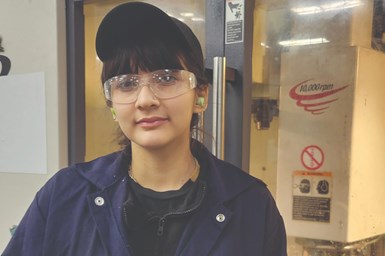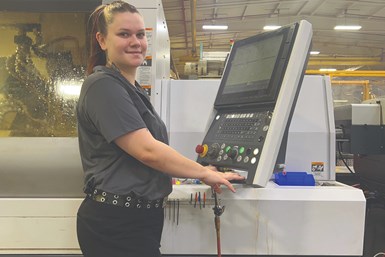Roles of Women in Manufacturing Series: Machinists Julia Dister and Sarah Grieve
Julia and Sarah share their journeys to becoming machinists and give advice to anyone seeking a career in manufacturing.
Julia Dister is a tool and die apprentice at Smith & Richardson Inc. in Geneva, Illinois. Sarah Grieve is a Class A setup operator at EMC Precision in Elyria, Ohio. Both women share their journey to manufacturing.
Julia Dister’s Journey
Julia started in the workforce as a jewelry apprentice. She had some classes in community college that piqued her interest such as metal-smithing, casting and welding. She liked working with her hands and with metals, and thought jewelry would be fun. She completed the three-year apprenticeship and realized that it wasn’t the “fit” she thought it would be.
Julia realized she wanted to work with steel because, as she stated with a smile, “steel is really cool.” Her grandfather is a machinist and shared the interesting parts he has made and it inspired her to try machining.
Julia likes to describe her current position as a tool and die apprentice as “I make the things that make the things.” She said she enjoys the variety and working with steel. Everyone at Smith & Richardson was very welcoming and she likes working with like-minded people. Her three-year apprenticeship parallels a three-year trade school curriculum which she attends two evenings per week.
Sarah Grieve’s Journey
Sarah began her journey in high school by attending Lorain County Joint Vocational School for the precision machining technology program. She was placed at EMC Precision at the age of 16 and has been working there for eight years. After high school, she attended Lorain County Community College and earned her associate degree for manufacturing engineering.
Sarah truly enjoys her job at EMC Precision. She is provided with learning opportunities and a positive work environment. Sarah states, “At work, I get a sense of accomplishment when I complete a new part from start to finish and have made something from just a metal bar. I may work on the same machines every day, but every week I’m running different parts.”
Advice to Women (or Anyone) Seeking a Career in Manufacturing
Julia’s advice to those seeking a career in manufacturing is “Go for it! I recommend manufacturing to everyone. There are a lot of opportunities so take advantage of them.” Julia also adds, “Get out there and find like-minded people.”
Sarah’s advice to those seeking a career in manufacturing is, “Don’t feel discouraged to step out of your comfort zone or be scared away by the old notion that manufacturing jobs are dirty, grimy jobs only for men. I get to work on advanced equipment and machines I didn’t have a clue about before this job, and feel like I have really learned a valuable skill by entering this trade. Also, this skill travels well and makes it possible to get a job nearly anywhere.”
About the Author
Carli Kistler-Miller
Carli Kistler-Miller, MBA, has over 20 years of experience with communications, event/meeting planning, marketing, writing and operations. Email cmiller@pmpa.org at PMPA.
Related Content
-
Machining Unleaded Materials — Reliability is Possible
Leaded steel is no longer produced in the United States. How do shops approach unleaded brass and steel machining?
-
Craftsman Cribsheet No. 128: Why Do Machinists Say Tenths Instead of Ten Thousandths?
In machinist parlance, a tenth is a tenth of a thousandth, not a tenth of an inch.
-
‘Can You Hold This Tolerance?’ Is Not An Engineering Question
The implications of tolerances go far beyond mere technical compliance.











.jpg;maxWidth=300;quality=90)






